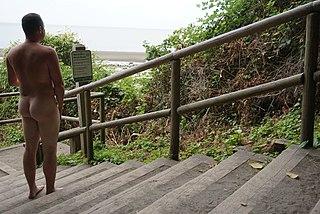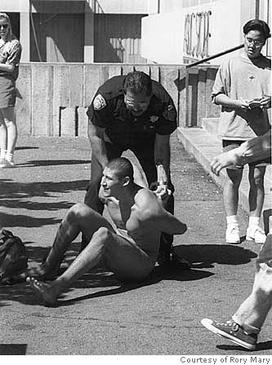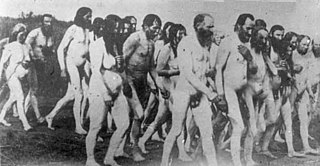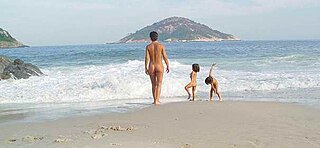
Naturism is a lifestyle of practicing non-sexual social nudity in private and in public; the word also refers to the cultural movement which advocates and defends that lifestyle. Both may alternatively be called nudism. Though the two terms are broadly interchangeable, nudism emphasizes the practice of nudity, whilst naturism highlights an attitude favoring harmony with nature and respect for the environment, into which that practice is integrated. That said, naturists come from a range of philosophical and cultural backgrounds; there is no single naturist ideology.

Indecent exposure is the deliberate public exposure by a person of a portion of their body in a manner contrary to local standards of appropriate behavior. Laws and social attitudes regarding indecent exposure vary significantly in different countries. It ranges from outright prohibition of the exposure of any body parts other than the hands or face to prohibition of exposure of certain body parts, such as the genital area, buttocks or breasts.

Wreck Beach is a nude beach located in Pacific Spirit Regional Park, a part of Electoral Area A just west of Vancouver, British Columbia, Canada. The clothing-optional section is clearly marked with signs and stretches about 6.7 kilometres or 4.2 miles from Acadia Beach, in the north, to the Booming Grounds Creek on the north arm of the Fraser River. The park is administered by Metro Vancouver, though Indigenous claims are repeatedly asserted, especially by the Musqueam Nation.

Black's Beach is a secluded section of beach beneath the bluffs of Torrey Pines on the Pacific Ocean in La Jolla, a community of San Diego, California. It is officially part of Torrey Pines State Beach. The northern portion of Black's Beach is owned and managed by the California Department of Parks and Recreation, while the southern portion of the beach, officially known as Torrey Pines City Beach, is jointly owned by the City of San Diego and the state park, and managed by the City of San Diego. This distinction is important as Black's Beach is most known as a nude beach, a practice that is now prohibited in the southern portion managed by the City of San Diego.

Luis Andrew Martinez was an activist who was known at the University of California, Berkeley as the Naked Guy.
Clothing laws vary considerably around the world. In most countries, there are no laws which prescribe what clothing is required to be worn. However, the community standards of clothing are set indirectly by way of prosecution of those who wear something that is not socially approved. Those people who wear insufficient clothing can be prosecuted in many countries under various offences termed indecent exposure, public indecency, nudity or other descriptions. Generally, these offences do not themselves define what is and what is not acceptable clothing to constitute the offence, and leave it to a judge to determine in each case.

Playa Zipolite is a beach community located in San Pedro Pochutla municipality on the southern coast of Oaxaca state in Mexico between Huatulco and Puerto Escondido.

Nude recreation consists of recreational activities which some people engage in while nude. Historically, the ancient Olympic Games were nude events. There remain some societies in Africa, Oceania, and South America that continue to engage in everyday public activities—including sports—without clothes, while in most of the world nude activities take place in either private spaces or separate clothing optional areas in public spaces. Occasional events, such as nude bike rides, may occur in public areas where nudity is not otherwise allowed.
Sunnyside North Beach is a clothes-optional beach located south of Mount Eliza, Port Philip Bay and approximately 12 kilometres from Frankston in the State of Victoria, Australia. It is designated as a legal nudist beach under the Nudity Act 1983. It is the only clothes-optional beach on the east side of Port Philip Bay.
Point Impossible Beach is a clothes-optional beach located at Torquay, west coast, in the State of Victoria, Australia. It is designated as a legal nudist beach under the Nudity Act 1983.

Nudity is sometimes used as a tactic during a protest to attract media and public attention to a cause, and sometimes promotion of public nudity is itself the objective of a nude protest. The practice was first documented in the 1650s with Quakers "naked as a sign" practice. Later the tactic was used by svobodniki in Canada in 1903, and photographs of their nude protests have been published. The tactic has been used by other groups later in the century, especially after the 1960s. Like public nudity in general, the cultural and legal acceptance of nudity as a tactic in protest also varies around the world. Some opponents of any public nudity claim that it is indecent, especially when it can be viewed by children; while others argue that it is a legitimate form of expression covered by the right to free speech.

A nude beach, sometimes called a clothing-optional or free beach, is a beach where users are at liberty to be nude. Nude beaches usually have mixed bathing. Such beaches are usually on public lands, and any member of the public is allowed to use the facilities without membership in any movement or subscription to any personal belief. The use of the beach facilities is normally anonymous. Unlike a naturist resort or facility, there is normally no membership or vetting requirement for the use of a nude beach. The use of nude beach facilities is usually casual, not requiring pre-booking. Nude beaches may be official, unofficial, or illegal.
Lighthouse Beach is a small section of the Fire Island National Seashore that is adjacent to Robert Moses State Park on New York's Long Island. It was notable for having sections that were officially designated as clothing optional prior to 2013.

Smaills Beach is a beach on the Pacific Ocean 7.6 kilometres (4.7 mi) southeast of the city centre of Dunedin, New Zealand. Located within the Ocean Grove Reserve adjacent to Tomahawk Beach, at the point where Otago Peninsula joins the mainland of the South Island, Smaills Beach is a white sand beach for much of its length, but its western end is covered in volcanic boulders. Just offshore from the beach, dominating the wave patterns of the surf, is the rocky outcrop known as Bird Island. Smaills Beach is clothing-optional, renowned for its wildlife, and popular with surfers.

Naturism refers to a lifestyle of practising non-sexual social nudity in private and in public, and to the cultural movement which advocates and defends that lifestyle. Both are also known as "nudism". Naturist organisations have existed in New Zealand since the 1930s. Although not a daily feature of public life, social nudity is practised in a variety of other contexts in New Zealand culture.
Pōhutukawa Bay is a beach north of Long Bay, located on the North Shore of Auckland. It is situated northeast of Ōkura, close to Piripiri Point. Directly south of Pōhutukawa Bay Beach is Granny's Bay Beach, and a little further south is Long Bay Regional Park. The beach is accessible only at low tide, and it is among one of Auckland's most popular naturist beaches. Public nudity is technically legal on any New Zealand beach where it is "known to occur". Getting to the beach requires going through the coastal track, a 6 km (3.7 mi) walk that starts from the beach carparks, and ends at the Ōkura River.










